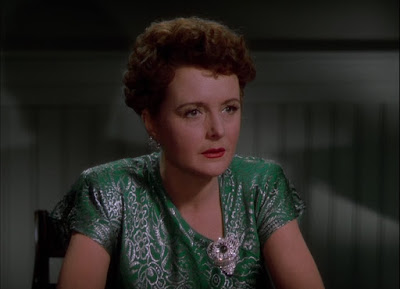Acting is pretend. Acting is illusion. We learn this at an early age. But, still, I believed for many years that an actor invested a bit of himself into every role, which meant that every role he played in one way or another reflected the person he truly was. I no longer believe that's true. A dumb actor can convey intelligence. An insensitive actor can convey sensitivity. A wildly impulsive actor can convey a steady calm. The substance of an actor (or the lack thereof) has no relevance on an actor's performance.
I thought, too, that an actor needed to be clever to properly develop the character that he was playing. But an actor relies more on instinct and emotion than intelligent thought.
Dramatic School (1938)
Of course, he can be carefully guided by a wise director, too.
It is fascinating to study a film actor who managed, despite changing trends and changing fortunes, to remain active for decades. An actor changes over time. This is certain. Some actors get better and some get worse. Some keep on learning, which assures that they keep on getting better. Some get tired and lazy, which stops them from learning anything new and sometimes even makes them forget what they already learned. Some gain confidence, understanding that their experience counts for something, and other lose confidence, fearing that their experience just means they've gotten old. Confidence is important to actors. Actors improve greatly as they gain confidence in their work. Mary Astor, a distinguished film veteran, turned in self-assured performances in Desert Fury (1947) and Act of Violence (1948).
Desert Fury (1947)
In contrast, Barbara Stanwyck wasn't always steady on her feet during her later years in film. The actress, who has been effortless and exact in her earlier days, was unusually self-conscious and exaggerated in Blowing Wild (1953) and The Violent Men (1955).
Of course, old age brings along physical infirmities. Stewart was regularly subjected to the deafening roar of bombers as a pilot during World War II. The experience left him with hearing loss, which worsened considerably as he got older. By the 1970s, it was difficult for Stewart to hear his dialogue cues. Don Siegel found this to be a great problem when he directed the actor in The Shootist (1976).
As I write this article, I remember the natural ease with which Tom Courtenay and Charlotte Rampling express deep emotions - grief, fear, love and rage - in 45 Years (2015).
I think of Anthony Hopkins' steady and decisive approach to his haunting role in The Father (2020). This is surely the confidence that only comes with longstanding experience.
That's it for the day. Just a few random thoughts about acting.
 |
| Mary Astor in Hush, Hush, Sweet Charlotte (1964) |
Here is a video version of this article.
































.jpg)






No comments:
Post a Comment